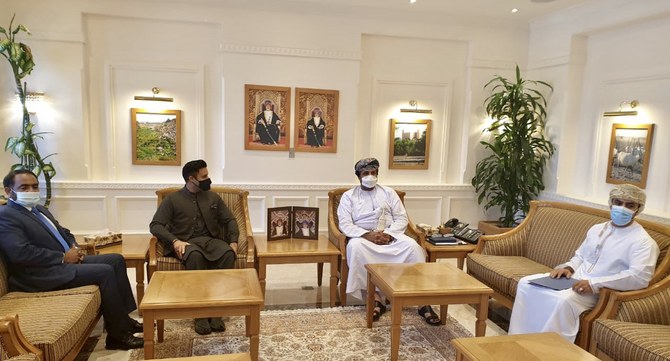ISLAMABAD: Pakistani and Omani officials discussed on Wednesday ways to enhance the presence of workers from the South Asian nation in the Gulf state’s manpower market.
Islamabad’s envoy to Muscat, Ahsan Wagan, and Syed Zulfikar Bukhari, a central leader of Pakistan’s ruling party and the prime mister’s former aide on overseas Pakistanis, met with Omani Labor Minister Mahad bin Said bin Ali Ba’owain.
The Pakistani embassy said in a tweet they discussed “way & means to enhance export of manpower from Pakistan.”
Today, Sayed Zulfikar Bukhari along with Ambassador Wagan called on H.E Dr Mahad bin Saeed bin Ali, Omani Minister of Labour to discuss way & means to enhance export of manpower from Pakistan. Mr. Bukhari also thanked HM and his govt. for providing great support during pandemic. pic.twitter.com/JtAiycQPat
— Pakistan Embassy Oman (@PakinOman) January 19, 2022
Bukhari told Arab News that Pakistan expects Oman would make ill “make us part of their 2040 mission and to increase man power especially in their port area.”
Under its 2040 vision, Oman is transiting from an oil-based economy toward a more diverse knowledge-based one.
Pakistan has been deepening its ties with the Gulf state recently.
Earlier this month, Oman Chamber of Commerce and Industry chairman Redha Al-Saleh headed a business delegation that arrived in Pakistan to enhance bilateral trade and investment cooperation.
The delegation met Pakistan’s Foreign Minister Shah Mahmood Qureshi, as well as officials from the Pakistani Ministry of Commerce and Investment, the Federation of Pakistan Chambers of Commerce and Industry and the chambers of commerce and industry in the cities of Karachi, Islamabad and Lahore.
During the visit, Qureshi “encouraged Oman to benefit from skilled manpower potential across diverse sectors,” the foreign office said in a statement.
“The Foreign Minister invited Omani businesses and the Pakistani diaspora to enter into investment projects and joint ventures in various fields.”
Qureshi also encouraged the Oman side to work with Pakistan to harness the full potential of the regional “economic corridor” that would connect the Gulf state to landlocked Central Asia and Afghanistan.
















